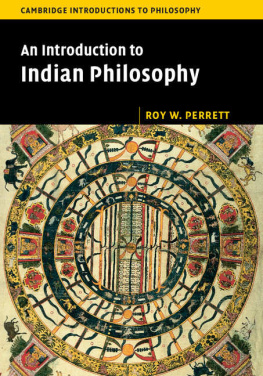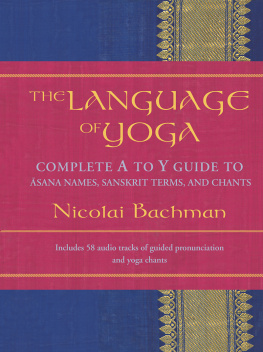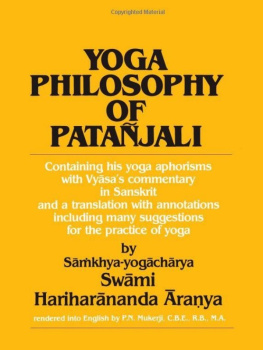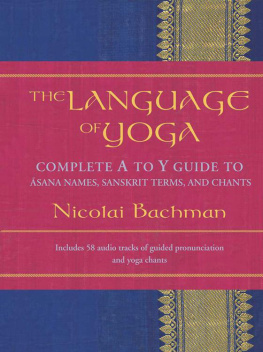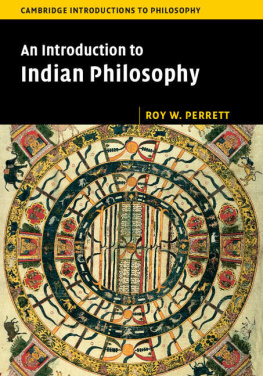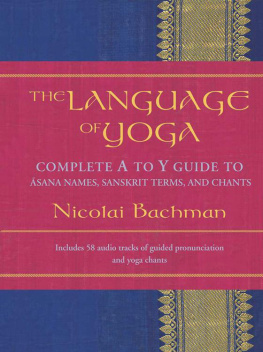A Brief
Sanskrit Glossary
A Spiritual Students Guide
to Essential Sanskrit Terms
Expanded 2nd Edition compiled by
Abbot George Burke
(Swami Nirmalananda Giri)

Published by
Light of the Spirit Press
lightofthespiritpress.com
Light of the Spirit Monastery
P. O. Box 1370
Cedar Crest, New Mexico 87008
www.OCOY.org
Copyright 2018 Light of the Spirit Monastery.
All rights reserved.
Library of Congress Control Number: 2018966780
Light of the Spirit Press, Cedar Crest, New Mexico
Second Edition 2018
BISAC Categories:
OCC021000 BODY, MIND & SPIRIT / Reference
REL032030 RELIGION / Hinduism / Sacred Writings
12242018
Preface
I t is very beneficial for students of Indian thought, of the Bhagavad Gita, the Upanishads, the Yoga Sutras of Patanjali, and other Indian scriptures and philosophical works to expand their vocabularies to include the sanskrit terms included in them. English books about these works often contain many untranslated sanskrit words because there are no concise English equivalents. This glossary contains full translations and explanations of many of the most commonly used sanskrit terms, and will help students of these spiritual treatises gain a fuller understanding in their studies.
We recommend four other dictionaries:
Yoga-Vedanta Dictionary by Swami Sivananda. Divine Life Society of South Africa
A Concise Dictionary of Indian Philosophy by John Grimes. State University of New York Press
Sanskrit Glossary of Yogic Terms by Swami Yogakanti. Yoga Publications Trust, Bihar, India
A Sanskrit Dictionary by John M. Denton. John M. Denton

A
Abhasavada: Doctrine holding that all creation is a reflection of the Supreme Reality.
Abhaya(m): Without fear; fearlessness; a state of steadfastness in which one is not swayed by fear of any kind.
Abheda: Non-difference; non-duality.
Abheda-ahamkara: The pure ego that identifies itself with Brahman or the Absolute.
Abhedananda, Swami: A direct disciple of Sri Ramakrishna, who spent many years traveling and teaching Vedanta and Yoga in America.
Abhimana: Egoism; conceit; attachment; I-sense; pride; the function of the ego; the delusion of me and mine; identification with the body.
Abhimani: One who has egoistic feeling.
Abhimata: Desired; favorite; attractive; agreeable, appealing; object of choice.
Abhinivesha: Clinging to earthly life; will to live; strong desire; false identification of the Self with the body or mind; an instinctive clinging to life and a dread of death.
Abhisheka(m): Bathingthe ritual pouring of various items over a sacred image or personage in homage and worship.
Abhyantara: Internal; inward.
Abhyasa: Sustained (constant) spiritual practice.
Abhyasa Yoga: Yoga, or union with God, through sustained spiritual practice.
Abhyasin: Yoga-practitioner.
Achala: Not moving; immovable; standing still; firm; steady; fixed, unwavering; without change.
Achamana: Sipping water from the hollowed palm of the hand; a preliminary simple rite connected with ritualistic worship.
Achara: 1) Immobile. 2) Right conduct; good behavior; custom; practice; external observance of established rules and laws; teaching.
Acharya: Preceptor; teacher; spiritual teacher/ guide; guru.
Achintya: Unthinkable; inconceivable; incomprehensible; inexplicable. A title of Brahman because the mind cannot conceive Its nature.
Achintya shakti: Inscrutable power ineffable force.
Achyuta: The indestructible; the unchanging; the imperishable onea title of Krishna.
Adesha: A divine command from within the being; teaching, as is upadeshateaching received while sitting near (upa).
Adhara: 1) To support or prop; support; substratum; body apparatus. In yoga, it means various places of the body where the attention is focussed for control, concentration, and meditation. 2) A reservoir of pranic energies, storage units for the energies that flow into the subtle bodies through the chakras, therefore often mistaken for a chakra.
Adharma: Unrighteousness; demerit, failure to perform ones proper duty; unrighteous action; lawlessness; absence of virtue; all that is contrary to righteousness (dharma).
Adhibhautika: Elemental.
Adhibhuta: Primal Being; pertaining to the elements; the primordial form of matter.
Adhidaiva: Primal God.
Adhidaivika: Pertaining, to the heaven or the celestial beings.
Adhikara: Authority; qualification; jurisdiction; prerogative; office; claim; privilege.
Adhikari(n): An eligible or qualified person; a worthy person. It implies both fitness and capability.
Adhimatra: The degree of vairagya when worldly enjoyment becomes a source of pain.
Adhishthana(m): Seat; basis; substratum; ground; support; abode; the body as the abode of the subtle bodies and the Self; underlying truth or essence; background.
Adhiyajna: Primal Sacrifice; Supreme Sacrifice.
Adhyatma: The individual Self; the supreme Self; spirit.
Adhyatmika: Adhyatmic; pertaining to the Self (Atman or Jivatman), individual and Supreme (Paramatman).
Adi: First, original, or primary.
Adi Purusha: The First or Original Purusha. See Purusha.
Adibhuta: Primal Being; Primal Element; Primordial Matter. Also: Supreme Being and Supreme Element.
Adidaiva: Primal God; Supreme God.
Adinath (Adi Nath): The first teacher of the Nath Panthi, or Nath Yogi Sampradaya, usually believed to be Shiva himself.
Adishakti: Primal Power.
Aditattva: The first principle; Brahman; Mula Prakriti; the first element (of matter) next but one above akasha in the gradation of subtlety.
Aditi: Boundless; unbounded; Infinite Motherthe source of all the cosmic forms of consciousness from physical upwards; in Vedic cosmology: the mother of the gods.
Aditya: The sun; the Sun God.
Adityas : Solar deities, the greatest of which is Vishnu.
Advaita: Non-dualism; non-duality; literally: not [a] two [dvaita].
Advaita Nishtha: Establishment in the state of non-duality.
Advaita vada: The theory that Brahman is the only existence; monism; Vedanta.
Advaita Vedanta: The teaching that there is only One Reality (Brahman-Atman), as found in the Upanishads. Non-dualistic philosophy, especially that of Shankara.
Advaitic: Non-dual; having to do with the philosophy of Advaita (Non-Dualism).
Advaitin: A proponent of Advaita philosophy.
Advaitist: A proponent of Advaita philosophy.
Adwitiya: Without a second.
Adya: Primordial; original.
Adyasakti: The Primal Energy; Avyaktam. or Mula Prakriti.
Agama: Scripture; particularly scriptures dealing with the four topics of temple construction and the making of images, philosophy, meditation practice, and methods of worship.
Agamapaya/agamapayi: That which appears and disappearscomes and goes.
Agami karma: Karma produced by present action that will be experienced by the individual in the future.
Agastya: A sage and reputed seer of many hymns in the Rig Veda.
Aghora: Not terrifying (ghora); benevolent; a title of Shiva.
Aghora Pantha: An order or sect of worshippers of Shiva (Shaivites).
Agni: Fire; Vedic god of fire.
Agnihotra: Fire offering; a Vedic fire sacrifice.
Agrahya: Unfit to be taken; that which cannot be grasped; that which cannot be understood; Brahman.
Aguna: Without guna or quality.
Next page



